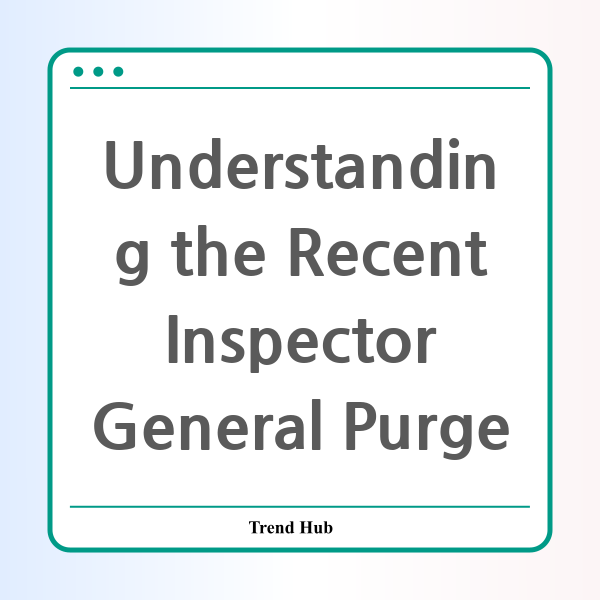* This website participates in the Amazon Affiliate Program and earns from qualifying purchases.

Have you ever wondered how those in power are held accountable? In recent news, the role of independent inspectors general has come under intense scrutiny, especially following significant firings in the federal government. This latest development raises critical questions about oversight and accountability within our institutions.
The White House recently carried out a drastic move by terminating the inspectors general (IGs) of at least 12 major federal agencies. This late-night purge could be seen as a strategic maneuver to replace these watchdogs with individuals who may not uphold the same commitment to transparency and integrity. The IGs, responsible for investigating fraud, waste, and abuse within the government, were abruptly notified via email that their services were no longer required.
Such dismissals not only appear to contravene federal law, which stipulates that Congress must be notified 30 days prior to any such termination, but they also signal a potential shift towards increased political control over these crucial oversight positions. Many of the terminated inspectors general were reportedly loyal to the previous administration and their exit raises alarms over the future of independent oversight in federal agencies.
When the IGs were dismissed, reactions from within the government echoed disbelief and outrage. Describing the purge as a "widespread massacre," one fired inspector general expressed concern that the replacements would be suspect to political loyalty rather than the integrity needed to fulfill the watchdog role effectively. Another highlighted that firing such a large number of IGs defies the very goals of improving government efficiency and combating corruption.
Historically, inspectors general serve indefinite terms across administrations, designed to remain insulated from political pressures. They hold significant authority to investigate allegations of misconduct and can help prevent the misuse of taxpayer funds. With their independence now compromised, many professionals fear that the integrity of oversight mechanisms could be severely undermined.
Interestingly, discussions around removing independent watchdogs seem to have started even before the most recent changes took place. Sources revealed that Trump's advisers had contemplated the removal of IGs during the transition period to the White House, indicating a long-standing strategy rather than an impulsive decision.
In the past, we have seen similar patterns, where presidents have dismissed inspectors general, often under the guise of performance issues. However, many critics assert these moves are politically charged, aimed at diminishing checks and balances in a system designed to curb potential abuses of power.
It is crucial to understand the role of inspectors general in maintaining government accountability. They are the watchdogs meant to keep federal agencies in check, ensuring that public funds are used responsibly and ethically. The independence of these positions is a cornerstone of effective governance, and any attempt to politicize them could leave the American public vulnerable to corruption and mismanagement.
As we move forward, it remains to be seen how these changes will affect the oversight landscape. Will the replacements prioritize transparency and accountability, or will they serve to shield governmental actions from scrutiny? For citizens, the stakes are high as these developments could redefine the relationship between the government and its constituents.
In conclusion, the recent purge of independent inspectors general raises alarm bells for anyone concerned about the integrity of our governmental oversight. As the situation unfolds, it will be essential to monitor how these changes impact the ability of watchdogs to function independently and effectively in their critical roles.
* This website participates in the Amazon Affiliate Program and earns from qualifying purchases.